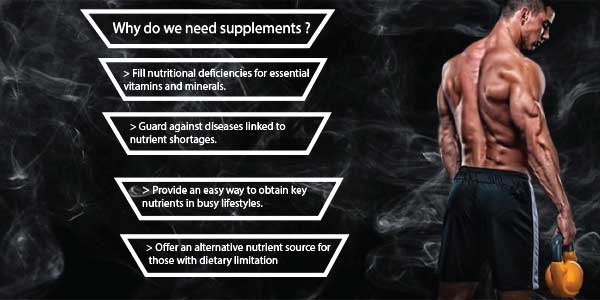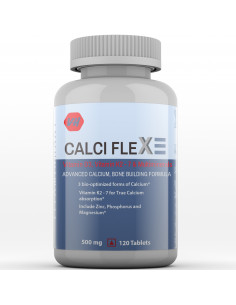- Supplement
- 1 likes
- 1863 views
Calcium is essential for maintaining strong bones, but it's not the only nutrient that affects bone health. Research suggests that a combination of vitamin K2, boron, vitamin D3, phosphorus, zinc, and magnesium may enhance the benefits of calcium supplementation, resulting in better overall bone health and a reduced risk of osteoporosis and fractures.
Vitamin K2 is involved in the activation of osteocalcin, a protein that helps incorporate calcium into the bone matrix. Studies have shown that supplementing with vitamin K2 can improve bone density and reduce the risk of fractures in postmenopausal women (1) (2). Boron stimulates the production of estrogen, testosterone, and vitamin D, which are all essential for bone density. Research has shown that boron supplementation can increase bone mineral density and reduce the risk of osteoporosis in postmenopausal women (3) (4).
Vitamin D3 is necessary for calcium absorption and bone health. Research has found that supplementing with vitamin D3 can improve bone density and reduce the risk of fractures in both younger and older individuals (5) (6). Phosphorus is a mineral that is important for bone structure and strength. Studies have shown that adequate phosphorus intake can improve bone mineral density and reduce the risk of osteoporosis (7) (8).
Zinc is involved in bone growth and development, and studies have found that zinc supplementation can improve bone density and reduce the risk of fractures in older adults (9) (10). Magnesium is involved in calcium metabolism and bone formation, and studies have shown that magnesium supplementation can improve bone density and reduce the risk of fractures in postmenopausal women (11) (12).
Overall, combining these nutrients with calcium supplementation may enhance the benefits of calcium for bone health. Studies have shown that a combination of calcium, vitamin D3, and vitamin K2 can improve bone density and reduce the risk of fractures in postmenopausal women (13) (14). Other studies have found that a combination of calcium, phosphorus, magnesium, and vitamin D can improve bone density in both younger and older individuals (15) (16). Therefore, including vitamin K2, boron, vitamin D3, phosphorus, zinc, and magnesium in a calcium supplementation regimen may offer additional benefits for overall bone health.
References :-
- Knapen MHJ, Schurgers LJ, Vermeer C. Vitamin K2 supplementation improves hip bone geometry and bone strength indices in postmenopausal women. Osteoporos Int. 2007;18(7):963-972.
- Cheung AM, Tile L, Lee Y, et al. Vitamin K supplementation in postmenopausal women with osteopenia (ECKO trial): a randomized controlled trial. PLoS Med. 2008;5(10):e196.
- Nielsen FH, Hunt CD, Mullen LM, Hunt JR. Effect of dietary boron on mineral, estrogen, and testosterone metabolism in postmenopausal women. FASEB J. 1987;1(5):394-397.
- Nielsen FH. Boron in human and animal nutrition. Plant Soil. 1997;193(1-2):199-208.
- Bischoff-Ferrari HA, Dawson-Hughes B, Willett WC, et al. Effect of Vitamin D on falls: a meta-analysis. JAMA. 2004;291(16):1999-2006.
- Bolland MJ, Grey A, Avenell A, et al. Calcium supplements with or without vitamin D and risk of cardiovascular events: reanalysis of the Women’s Health Initiative limited access dataset and meta-analysis. BMJ. 2011;342:d2040.
- Kerstetter JE, O'Brien KO, Insogna KL. Dietary protein affects mineral status and turnover differently in adolescent males and females. Am J Clin Nutr. 2002;75(3):609-615.
- Heaney RP. Phosphorus Nutrition and the Treatment of Osteoporosis. Mayo Clinic Proc. 2004;79(1):91-97.
- Yamaguchi M, Uchiyama S. Zinc is an Essential Trace Element for Bone Development. J Trace Elem Exp Med. 1998;11(4):239-254.
- Huang ZB, Wan SL, Lu YJ, Ning L, Liu C, Fan SW. Does zinc supplementation enhance the clinical efficacy of alendronate in postmenopausal osteoporosis? A double-blind, randomized, controlled trial. Osteoporos Int. 2015;26(2):567-572.
- Castiglioni S, Cazzaniga A, Albisetti W, Maier JA. Magnesium and Osteoporosis: Current State of Knowledge and Future Research Directions. Nutrients. 2013;5(8):3022-3033.
- Aydin H, Deyneli O, Yavuz D, et al. Short-term oral magnesium supplementation suppresses bone turnover in postmenopausal osteoporotic women. Biol Trace Elem Res. 2010;133(2):136-143.
- Knapen MHJ, Schurgers LJ, Vermeer C. Vitamin K2 supplementation improves hip bone geometry and bone strength indices in postmenopausal women. Osteoporos Int. 2007;18(7):963-972.
- Cheung AM, Tile L, Lee Y, et al. Vitamin K supplementation in postmenopausal women with osteopenia (ECKO trial): a randomized controlled trial. PLoS Med. 2008;5(10):e196.
- Bonjour JP, Carrie AL, Ferrari S, Clavien H, Slosman D, Theintz G. Calcium-enriched foods and bone mass growth in prepubertal girls: a randomized, double-blind, placebo-controlled trial. J Clin Invest. 1997;99(6):1287-1294.
- Fuleihan GE-H, Nabulsi M, Tamim H, et al. Nutritional osteoporosis: deficiency of vitamin D, calcium, and trace elements. Metabolism. 2008;57(2):131-137.





